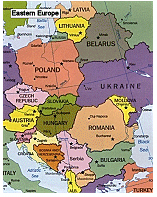
|
Jennifer Yoder, Associate Professor of Government, GO258 East European Politics |
||||||||||||||||||||||||||||||||||||||||||||||||||||||||||||||||||||||||||||
|
This course is an introduction to one of the most exciting areas of study in the last decade and a half: the politics and societies of East Europe. Until the fall of the "Iron Curtain" in 1989, East Europe was a mystery to most American students of comparative politics and international relations. Many social scientists viewed the region as a monolith and the politics and societies of Soviet satellites as static. To the contrary, as this course demonstrates, there was a range of patterns of political and cultural adaptation to communism in East Europe. Since 1989, there have been notable differences among these countries in the strategies and outcomes of democratic transition. To understand the nature of these differences, we will begin with an examination of interwar politics followed by the communist takeover of East Europe after 1945. We will then trace the development of communism in the region, emphasizing important events such as the Hungarian uprising of 1956 and the Prague Spring of 1968 and exploring the rise of opposition movements in the 1980s. Our analysis then turns to the causes, meanings, and effects of one of the most memorable events of the twentieth century the "velvet revolutions" of 1989 that brought an end to four decades of communism in East Europe. The second half of the course investigates a number of important themes relevant to the on-going processes of political, economic, and social change in East Europe. In the final weeks of the course, we will consider where these changes may be leading, with special attention to old "ghosts," new forces in politics, and the integration of East Europe into NATO and the European Union. Course RequirementsThese required books are available in paperback the Colby Bookstore; Reinventing Politics, Vladimir TismaneanuThe Magic Lantern, Timothy Garton Ash The Haunted Land: Facing Europe's Ghosts after Communism, Tina Rosenberg Developments in Central and East European Politics 3, S. White, J. Batt & P. Lewis Café Europa: Life after Communism, Slavenka Drakulic Additional articles may be assigned and put on library reserve. There will be several short papers for this course. Details about the assignments will be provided in class. Mid-term and final exams will be given on the dates indicated below. In-class, short answer, identification, and essay format. Regular participation in classis essential. This means coming to class prepared, having read all assignments, and contributing to class discussions
|
|||||||||||||||||||||||||||||||||||||||||||||||||||||||||||||||||||||||||||||
|
Grading Formula Participation and
attendance 10% |
|||||||||||||||||||||||||||||||||||||||||||||||||||||||||||||||||||||||||||||
| |||||||||||||||||||||||||||||||||||||||||||||||||||||||||||||||||||||||||||||
|
Useful links: http://www.law.nyu.edu/eecr/ East European Constitutional Review http://www.freedomhouse.org/ Freedom House (measures democracy in countries) http://www.transparency.org/ Transparency International (measures corruption in countries) http://www.parties-and-elections.de/indexe.html Parties and Elections in Europe http://europa.eu.int/ European Union homepage http://www.europeonline.com/ Europeonline has information on the EU and East European countries http://culture.tol.cz/look/CER/home.tpl?IdLanguage=1&IdPublication=14&NrIssue=44 Transitions On-line Central Europe has news from the region http://www.columbia.edu/cu/sipa/REGIONAL/ECE/ Columbia University's SIPA has excellent country profiles http://www.rferl.org/newsline/ Radio Free Europe/Radio Liberty has regional news
|
|||||||||||||||||||||||||||||||||||||||||||||||||||||||||||||||||||||||||||||